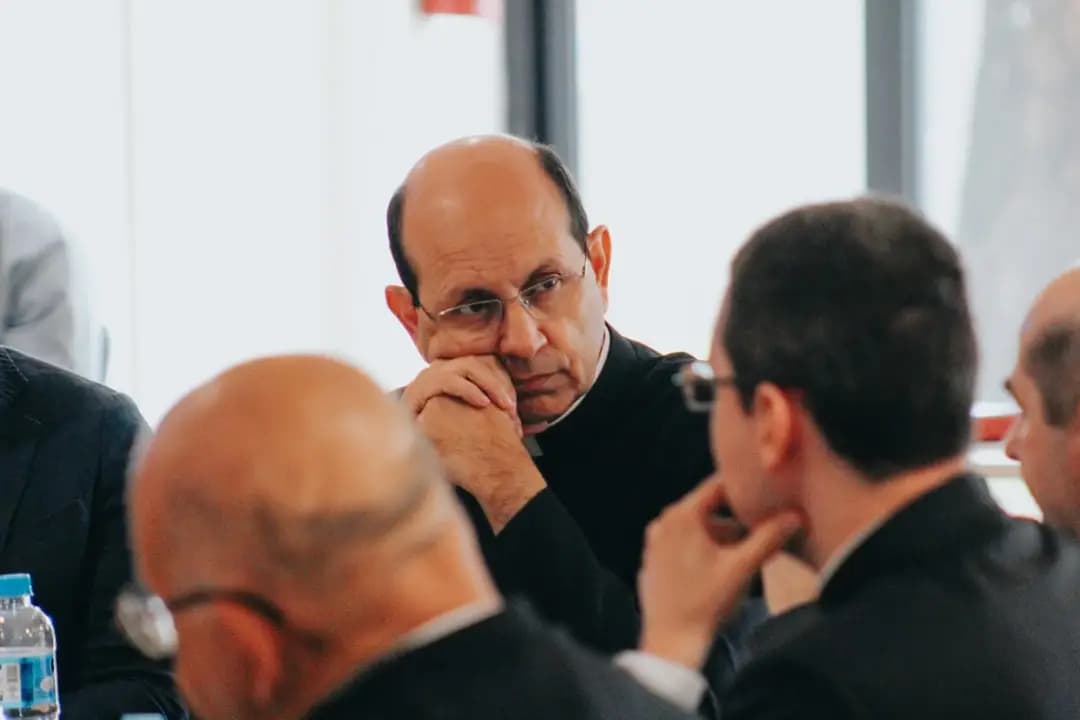SÃO PAULO – In a move that caught many observers by surprise, the Brazilian bishops’ conference, traditionally perceived to lean to the left, recently staged a high-profile summit for “influencer” priests, most of whom are associatied with the traditionalist and conservative circles around former President Jair Bolsonaro.
The group of clerical “influencers,” who have high social media profiles, was mostly formed by traditionalist priests and members of Brazil’s Charismatic Catholic Renewal, who tend to align themselves with the ideas of Bolsonaro. The former president frequently clashed with the bishops’ conference during his term, once famously calling it “the rotten part of the Church.”
Strikingly, during the recent Oct. 29-30 summit, hosted by the Episcopal Commission of Communications, other priests who also have strong online followings, such as human rights activist Father Julio Lancelloti, but who are seen as having more progressive views, were not on the guest list.
Organizers explained that the initiative of bringing together “influencers” began in 2015, but back then the group focused on Catholic singers. Today, while some musicians also took part in the encounter, but the basic selection criteria was clergy with substantial social media followings.
The CNBB posted videos and pictures of the meeting on social media week. Each post drew dozens of comments, many of which reflected surprise over the list of participants, especially the most controversial, Father Paulo Ricardo de Azevedo Junior.
Famous due to his online classes – which are accessible through a scheme of subscriptions – and his public remarks against left-wing clergy, Ricardo gained a reputation as a “defender of true Catholicism” among traditionalists over the past decade. On many occasions, he criticized actions of the CNBB and of the Church as a whole.
His friendship with Olavo de Carvalho (1947-2022), also generated controversy. De Carvalho, a journalist and self-proclaimed philosopher, published articles about the growing social influence of the so-called “cultural Marxism” for decades, denouncing the ways the left-wing was supposedly taking control over society and the Church.
De Carvalho was considered a kind of in-house intellectual of the Bolsonaro administration, despite the fact that he lived in Virginia. A picture of Ricardo holding a large gun side by side with de Carvalho went viral on Brazilian social media.
According to CNBB reports, the participants were informed about the Conference’s 2015 initiative and the idea of transforming such a group into something permanent. They exchanged impressions and experiences and prayed together.
Individual video interviews were produced by the CNBB’s journalists with some of them and were posted online, with Ricardo among those who were featured.
Some analysts saw the initiative as an institutional move by the bishops’ conference to draw these more conservative priests closer to the episcopate after years of run-ins. Founded 60 years ago by Archbishop Helder Camara, a central figure in the history of Liberation Theology in Brazil, the CNBB has been mostly headed by progressives over its history.
In the opinion of Father Manoel Godoy, a prestigious theologian who taught for years at the Jesuits’ College in Belo Horizonte, the move apparently meant that “the CNBB wants to show them that it has changed.”
“It seems to me that the CNBB wanted them to know that it’s not as radical as it used to be and as it was seen by them. So, they will be able to count on the episcopate now,” he told Crux.
While the current heads of the CNBB include some progressives, the president is Archbishop Jaime Spengler of Porto Alegre – who was recently appointed a cardinal – and the secretary-general is Auxiliary Bishop Ricardo Hoepers of Brasilia, both seen as moderates.
Earlier, the CNBB had supported a study about the phenomenon of Catholic digital influencers, coordinated by Auxiliary Bishop of Belo Horizonte Joaquim Mol Guimarães. Moises Sbadelotto, an expert in Catholic communications and a professor at the Pontifical Catholic University of Belo Horizonte, was one of the members of the study group.
In his opinion, the digital influencers who met in Brasilia “are not representative of the Brazilian Church’s diversity.”
“There were only 17 priests there – and we have many more ministers in Brazil with a relevant presence on the internet,” he told Crux.
Sbadelotto explained that the investigation on Catholic influencers established five parameters to assess their legitimacy: 1) the primacy of the Gospel of Jesus (the influencer must work to announce it, and must be true to the Jesus of the Gospel); 2) the primacy of charity (which means that the influencer must guide its actions by love and cordiality); 3) the primacy of grace (the influencer must recognize that he or she is a servant of Jesus’s mission and is not a know-it-all); 4) the primacy of synodality (the influencer must understand that all baptized have a role in the Church); 5) the primacy of ecclesial unity (the influencer must work for it and avoid aggressive manifestations against other members of the Church, including the bishops and the Pope).
“Some of those influencers have manifested aggressive opinions against the CNBB. We need to analyze their actions according to those parameters,” Sbardelotto said.
Nonetheless, he thinks the initiative of inviting those priests to form a group of influencers may be positive, given that Pope Francis has said on numerous occasions that the Church should be open to everybody.
“But intolerance can not be tolerated forever. If after that meeting, some of them keep releasing videos against the episcopate and even the pope, other actions must be taken,” he said.














